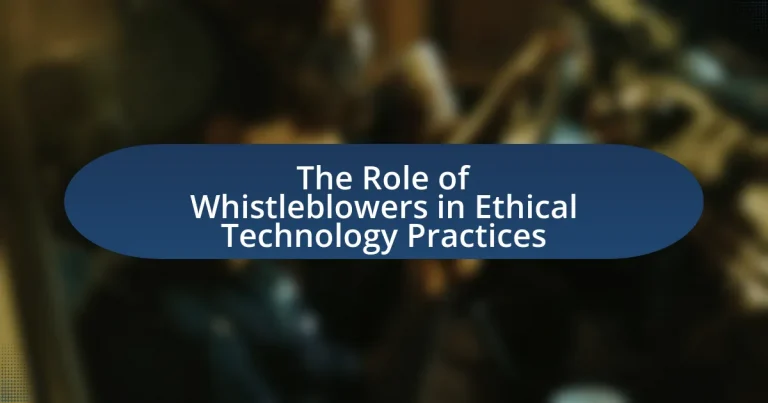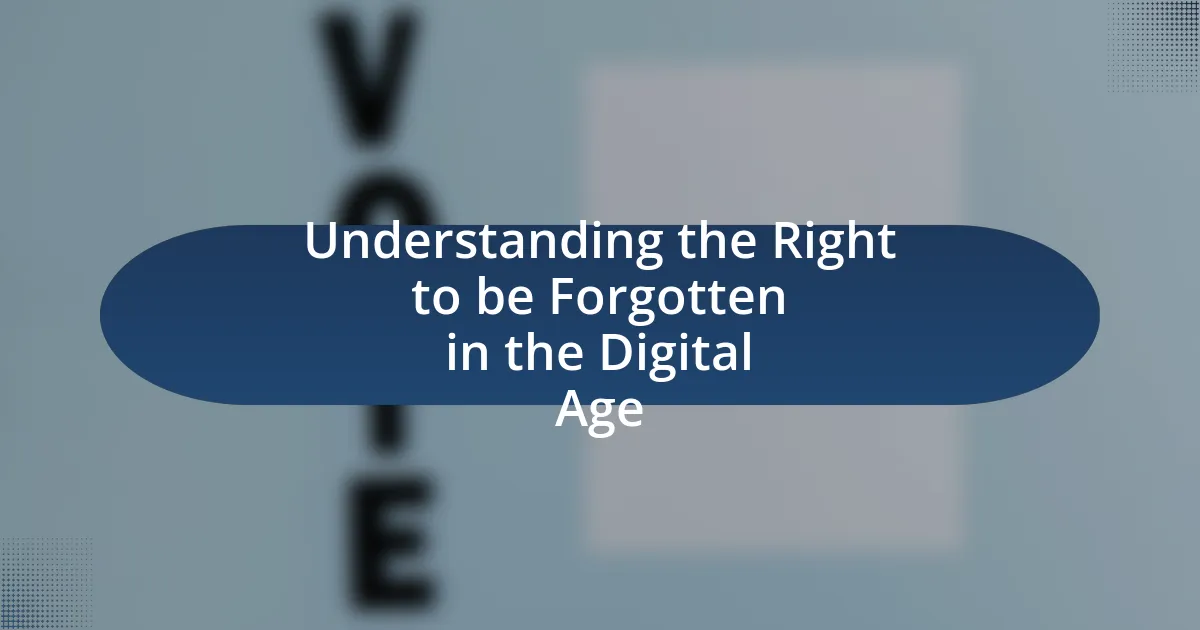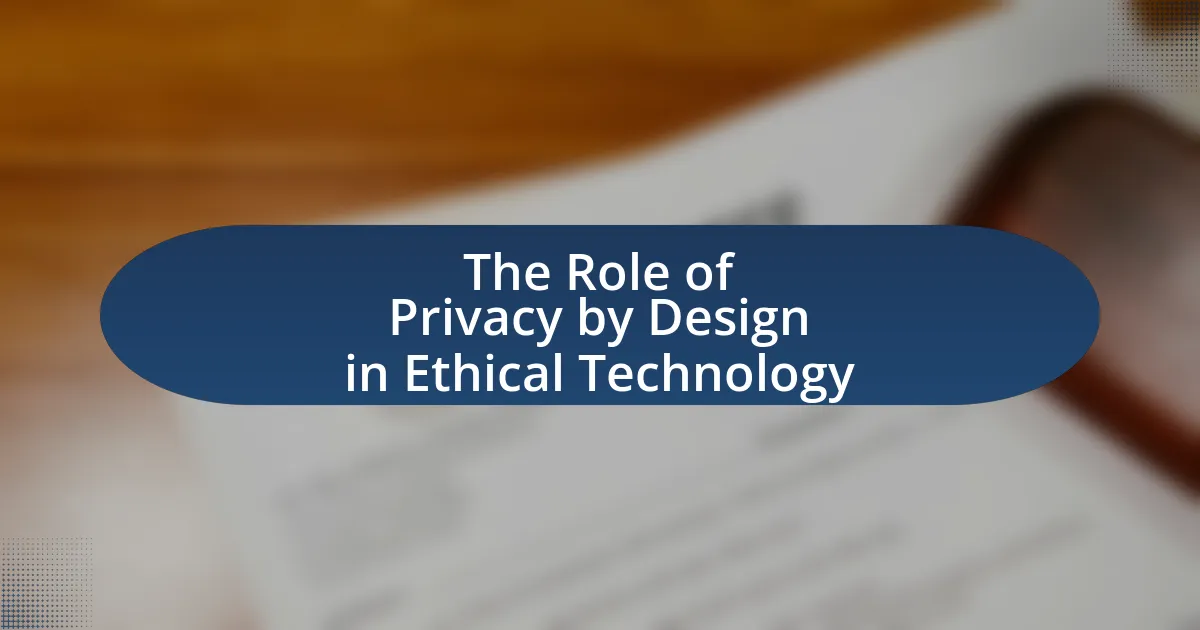Whistleblowers are individuals who expose unethical practices within organizations, playing a vital role in promoting ethical technology practices. This article examines the significance of whistleblowers in the technology sector, highlighting their contributions to accountability, transparency, and ethical standards. It discusses the ethical dilemmas they face, the challenges of retaliation and lack of legal protections, and the impact of corporate culture on whistleblowing. Additionally, the article explores how whistleblowers influence policy changes, the role of public perception, and the importance of fostering supportive environments for ethical reporting. Emerging technologies and resources available for whistleblowers are also addressed, emphasizing their critical role in shaping ethical practices in the tech industry.
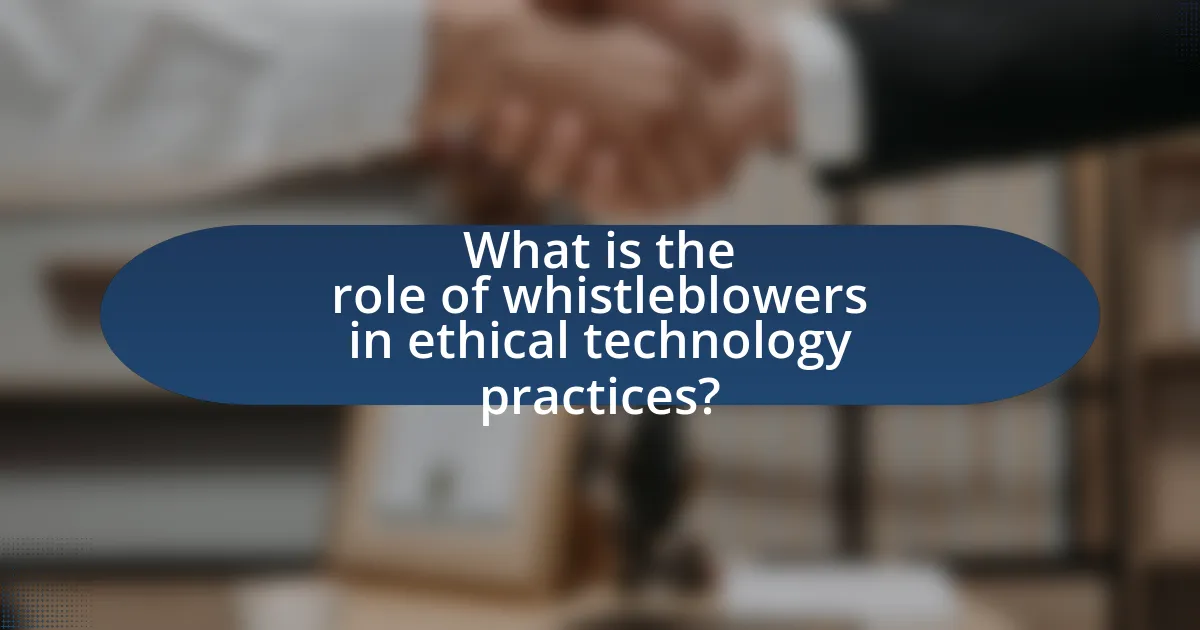
What is the role of whistleblowers in ethical technology practices?
Whistleblowers play a crucial role in promoting ethical technology practices by exposing unethical behaviors and practices within organizations. Their disclosures often reveal violations of laws, regulations, or ethical standards, which can lead to accountability and reform. For instance, whistleblowers like Edward Snowden highlighted significant privacy violations by government agencies, prompting public debate and policy changes regarding surveillance practices. This demonstrates that whistleblowers not only protect public interest but also encourage organizations to adhere to ethical standards, thereby fostering a culture of transparency and responsibility in technology development and implementation.
Why are whistleblowers important in the technology sector?
Whistleblowers are important in the technology sector because they expose unethical practices, ensuring accountability and transparency. Their disclosures can reveal issues such as data breaches, privacy violations, and fraudulent activities, which can significantly impact consumer trust and safety. For instance, the whistleblower case of Christopher Wylie, who revealed Cambridge Analytica’s misuse of Facebook data, highlighted the need for stricter data protection regulations and led to increased scrutiny of tech companies. This demonstrates that whistleblowers play a crucial role in promoting ethical standards and protecting public interests within the technology industry.
What ethical dilemmas do whistleblowers address in technology?
Whistleblowers in technology address ethical dilemmas such as data privacy violations, misuse of artificial intelligence, and lack of transparency in algorithms. These individuals often confront situations where they must choose between loyalty to their employer and the public’s right to know about harmful practices. For instance, the Cambridge Analytica scandal revealed how personal data was exploited without consent, highlighting the ethical responsibility of whistleblowers to expose such breaches. Additionally, whistleblowers may face retaliation, which raises questions about the protection of individuals who report unethical behavior in tech companies. Their actions can lead to significant changes in policies and practices, emphasizing the importance of ethical standards in technology.
How do whistleblowers contribute to accountability in tech companies?
Whistleblowers contribute to accountability in tech companies by exposing unethical practices and violations of laws or regulations. Their disclosures often reveal issues such as data privacy breaches, discrimination, or fraudulent activities, prompting investigations and reforms. For instance, the case of Frances Haugen, a former Facebook employee, highlighted internal practices that prioritized profit over user safety, leading to increased scrutiny from regulators and public outcry. This demonstrates how whistleblowers can catalyze change and enforce ethical standards within the tech industry.
What challenges do whistleblowers face in the technology industry?
Whistleblowers in the technology industry face significant challenges, including retaliation, lack of legal protections, and social isolation. Retaliation can manifest as job loss, harassment, or blacklisting, which discourages individuals from reporting unethical practices. A study by the Government Accountability Office found that 40% of whistleblowers experienced adverse employment actions after reporting misconduct. Additionally, the legal framework often lacks robust protections for whistleblowers in the tech sector, making it difficult for them to seek justice without risking their careers. Social isolation occurs as colleagues may distance themselves from whistleblowers, fearing association with someone who challenges the status quo. These factors create a hostile environment that can deter potential whistleblowers from coming forward.
What legal protections exist for whistleblowers in technology?
Whistleblowers in technology are protected by various legal frameworks, including the Whistleblower Protection Act, which safeguards individuals who report misconduct in federal agencies. Additionally, many states have their own whistleblower protection laws that extend to private sector employees, ensuring they cannot be retaliated against for reporting illegal activities or violations of regulations. The Dodd-Frank Wall Street Reform and Consumer Protection Act also provides protections and financial incentives for whistleblowers who report securities law violations, specifically in the financial and technology sectors. These laws collectively aim to encourage the reporting of unethical practices while safeguarding the whistleblower’s employment and rights.
How do corporate cultures impact whistleblowing in tech?
Corporate cultures significantly influence whistleblowing in tech by shaping employees’ willingness to report unethical practices. A culture that promotes transparency, accountability, and ethical behavior encourages individuals to come forward with concerns, as seen in companies like Salesforce, which has established clear channels for reporting misconduct. Conversely, a culture that prioritizes profit over ethics or fosters fear of retaliation can deter whistleblowing, as evidenced by a 2020 study from the Ethics & Compliance Initiative, which found that 60% of employees in toxic environments chose not to report wrongdoing due to fear of negative consequences. Thus, the nature of corporate culture directly affects the likelihood and frequency of whistleblowing in the technology sector.
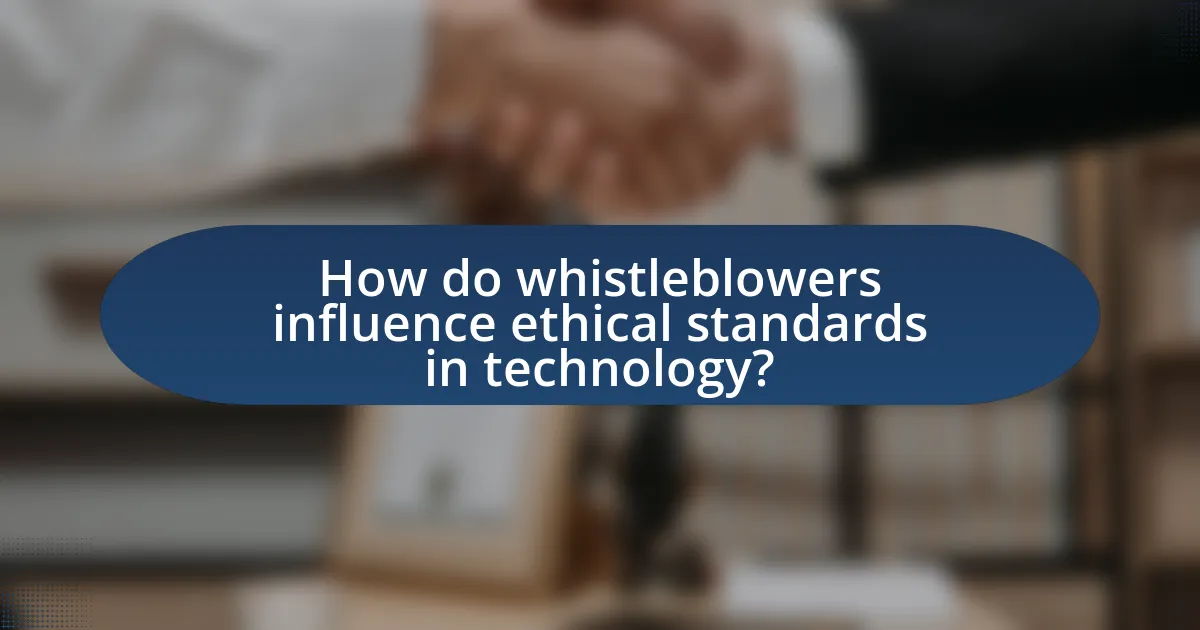
How do whistleblowers influence ethical standards in technology?
Whistleblowers influence ethical standards in technology by exposing unethical practices and fostering accountability within organizations. Their disclosures often lead to public scrutiny, prompting companies to reevaluate and improve their ethical guidelines. For instance, the revelations by whistleblower Edward Snowden regarding NSA surveillance practices sparked widespread debate about privacy and ethics in technology, resulting in calls for reform and greater transparency in governmental and corporate data handling. Such actions not only highlight existing ethical breaches but also encourage the establishment of more robust ethical frameworks to prevent future misconduct.
What are the consequences of whistleblowing for technology companies?
Whistleblowing in technology companies can lead to significant legal, financial, and reputational consequences. When employees report unethical practices, companies may face legal actions, resulting in fines or sanctions; for instance, the case of Uber in 2017, where whistleblower allegations led to a $148 million settlement over data breaches. Financially, companies may experience stock price declines following negative publicity, as seen with Facebook after whistleblower Frances Haugen’s revelations in 2021, which contributed to a drop in market value. Additionally, reputational damage can lead to loss of consumer trust and difficulties in attracting talent, as public perception shifts against companies perceived as unethical. These consequences underscore the critical role of whistleblowers in promoting ethical practices within the technology sector.
How can whistleblowing lead to policy changes in tech firms?
Whistleblowing can lead to policy changes in tech firms by exposing unethical practices and prompting internal investigations. When employees report misconduct, such as data privacy violations or discriminatory practices, it often triggers a review of existing policies and procedures. For instance, the 2013 whistleblower case involving Edward Snowden revealed significant surveillance overreach by the NSA, leading to public outcry and subsequent reforms in surveillance laws. This demonstrates that whistleblowing not only highlights issues but also serves as a catalyst for change, compelling organizations to adopt more ethical practices and enhance accountability.
What role does public perception play in the aftermath of whistleblowing?
Public perception significantly influences the aftermath of whistleblowing by shaping the response of organizations, the legal system, and society at large. When the public views whistleblowers positively, it can lead to increased support for their actions, potentially resulting in protective legislation and organizational reforms. Conversely, negative public perception can result in retaliation against whistleblowers, discouraging future disclosures and perpetuating a culture of silence. For instance, a study by the Ethics Resource Center found that organizations with a positive public image of whistleblowers are more likely to implement protective measures for them, highlighting the direct correlation between public perception and the outcomes for whistleblowers.
How can technology companies foster a culture that supports whistleblowers?
Technology companies can foster a culture that supports whistleblowers by implementing robust reporting mechanisms and ensuring strong protections against retaliation. Establishing anonymous reporting channels encourages employees to voice concerns without fear, while clear anti-retaliation policies create a safe environment for whistleblowers. Research indicates that organizations with strong whistleblower protections experience higher reporting rates of unethical behavior, which can lead to improved ethical standards and accountability. For instance, a study by the Ethics & Compliance Initiative found that organizations with effective whistleblower programs reported 50% more instances of misconduct being addressed.
What best practices can organizations implement to encourage ethical reporting?
Organizations can implement several best practices to encourage ethical reporting, including establishing clear reporting channels, providing training on ethical standards, and ensuring protection for whistleblowers. Clear reporting channels, such as anonymous hotlines or designated ethics officers, facilitate the reporting process and make employees feel safe to come forward. Training on ethical standards helps employees understand what constitutes unethical behavior and the importance of reporting it. Additionally, organizations must ensure protection for whistleblowers by implementing policies that prevent retaliation, as studies show that fear of retaliation is a significant barrier to reporting unethical practices. For instance, a 2016 study by the Ethics & Compliance Initiative found that 49% of employees who witnessed misconduct did not report it due to fear of retaliation.
How can training programs help in creating awareness about whistleblowing?
Training programs can significantly enhance awareness about whistleblowing by educating employees on the importance of reporting unethical behavior and the processes involved. These programs provide clear guidelines on what constitutes whistleblowing, the protections available to whistleblowers, and the potential consequences of failing to report misconduct. For instance, a study by the Ethics & Compliance Initiative found that organizations with comprehensive training programs saw a 30% increase in reporting rates of unethical behavior. This demonstrates that effective training not only informs employees but also fosters a culture of transparency and accountability, encouraging individuals to speak up without fear of retaliation.
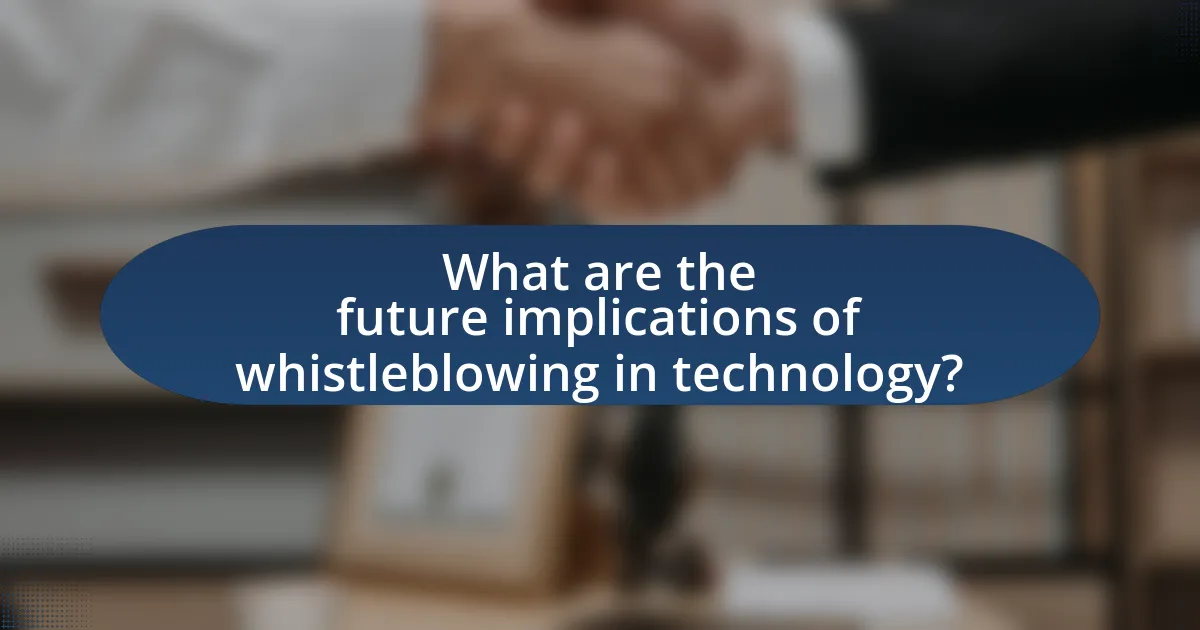
What are the future implications of whistleblowing in technology?
Whistleblowing in technology will increasingly serve as a critical mechanism for accountability and ethical compliance. As technology evolves, the potential for unethical practices, such as data misuse and privacy violations, rises, prompting a greater need for individuals to report misconduct. For instance, the 2020 case of a whistleblower exposing Facebook’s handling of user data highlighted the significant impact whistleblowers can have on public awareness and regulatory scrutiny. This trend suggests that future whistleblowers will play a vital role in shaping corporate policies and influencing legislation, as seen with the introduction of the EU’s General Data Protection Regulation, which was partly driven by public demand for accountability in tech companies.
How is technology evolving the landscape of whistleblowing?
Technology is evolving the landscape of whistleblowing by providing secure, anonymous platforms for reporting misconduct. These platforms, such as encrypted communication tools and dedicated whistleblower websites, enhance confidentiality and protect the identity of individuals who expose wrongdoing. For instance, the use of blockchain technology ensures that reports are tamper-proof and verifiable, which increases trust in the whistleblowing process. Additionally, advancements in artificial intelligence enable the analysis of large datasets to identify patterns of unethical behavior, making it easier for whistleblowers to substantiate their claims. These technological innovations not only empower whistleblowers but also encourage a culture of transparency and accountability within organizations.
What role do digital platforms play in facilitating whistleblower reports?
Digital platforms play a crucial role in facilitating whistleblower reports by providing secure, anonymous channels for individuals to disclose wrongdoing. These platforms often incorporate encryption and privacy features that protect the identity of whistleblowers, thereby encouraging more individuals to come forward without fear of retaliation. For instance, platforms like SecureDrop and GlobaLeaks have been specifically designed to allow whistleblowers to submit information safely, which has led to numerous high-profile disclosures in various sectors, including government and corporate environments. The effectiveness of these platforms is evidenced by the increased number of reports filed through them, highlighting their importance in promoting transparency and accountability in ethical technology practices.
How can emerging technologies enhance whistleblower protection?
Emerging technologies can enhance whistleblower protection by utilizing secure communication channels, anonymity features, and advanced data encryption. These technologies, such as blockchain and secure messaging apps, ensure that whistleblowers can report misconduct without fear of retaliation or exposure. For instance, blockchain technology provides an immutable record of reports, making it difficult for organizations to tamper with or dismiss claims. Additionally, secure messaging platforms like Signal or encrypted email services allow for confidential communication, further safeguarding the identity of whistleblowers. Studies have shown that organizations implementing these technologies experience increased reporting rates, indicating a greater sense of security among potential whistleblowers.
What can individuals do to support whistleblowers in the tech industry?
Individuals can support whistleblowers in the tech industry by advocating for stronger legal protections and creating a culture of transparency. Advocacy for laws such as the Whistleblower Protection Act can help ensure that whistleblowers are shielded from retaliation, which is crucial given that 90% of whistleblowers face some form of retaliation according to a study by the Government Accountability Office. Additionally, individuals can foster an environment where ethical concerns are openly discussed, encouraging employees to report wrongdoing without fear. By supporting organizations that provide resources and legal assistance to whistleblowers, individuals can further enhance the safety and effectiveness of those who expose unethical practices in technology.
How can awareness campaigns help in promoting ethical practices?
Awareness campaigns can significantly promote ethical practices by educating the public and stakeholders about ethical standards and the importance of integrity in technology. These campaigns raise consciousness regarding ethical dilemmas and encourage individuals to report unethical behavior, thereby fostering a culture of accountability. For instance, a study by the Ethics & Compliance Initiative found that organizations with strong ethics programs, often supported by awareness campaigns, experience 50% fewer incidents of misconduct. This demonstrates that effective awareness initiatives not only inform but also empower individuals to act ethically and report violations, ultimately enhancing ethical standards within the technology sector.
What resources are available for whistleblowers seeking support?
Whistleblowers seeking support can access various resources, including legal assistance, advocacy organizations, and government hotlines. Legal assistance is crucial, as organizations like the National Whistleblower Center provide guidance on whistleblower rights and protections under laws such as the Whistleblower Protection Act. Advocacy organizations, such as the Government Accountability Project, offer support and resources for whistleblowers, including counseling and legal representation. Additionally, government hotlines, like the U.S. Office of Special Counsel, allow whistleblowers to report misconduct confidentially and receive guidance on the reporting process. These resources collectively empower whistleblowers to navigate the complexities of reporting unethical practices in technology.
